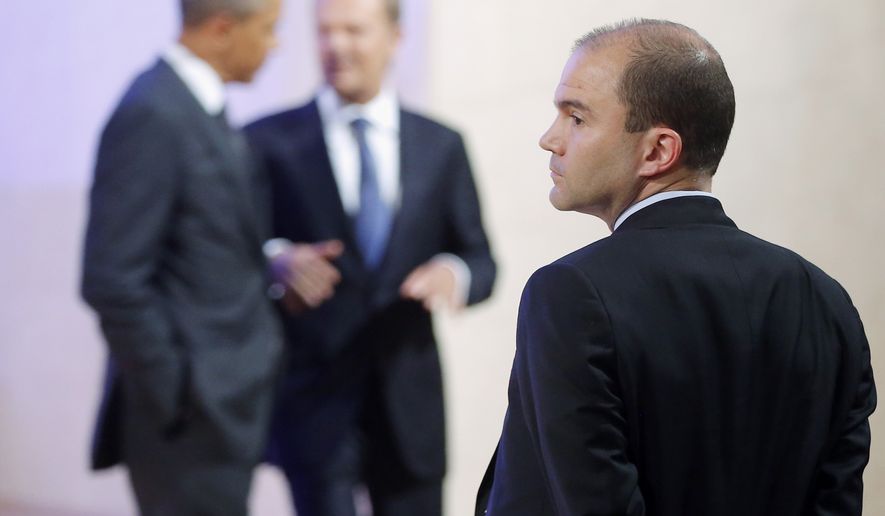After congressional Republicans called his bluff, President Obama’s deputy national security adviser refused Tuesday to testify to Congress about whether he misled the public in pushing the Iran nuclear deal, claiming executive privilege.
Ben Rhodes, a speechwriter who has become a top foreign policy adviser for Mr. Obama, landed in hot water after an interview with The New York Times in which he disparaged reporters as ignorant and easily manipulated and seemed to suggest that the administration relied on a false narrative to help sell the Iran deal.
But when congressional Republicans asked him to explain himself, the White House refused, saying it would intrude on the “separation of powers” of the federal government.
The excuse left Republicans on the House Oversight and Government Reform Committee nonplussed.
“You have plenty of time, Mr. Rhodes, to go out and talk to all the media friends and talk to the echo chamber that you brag about in The New York Times, but when it comes time to actually answer hard questions under oath, you decide not to do it,” said committee Chairman Jason Chaffetz, Utah Republican, who started the hearing without Mr. Rhodes.
W. Neil Eggleston, the White House’s top attorney, explained in a letter Monday that Mr. Rhodes wouldn’t be appearing because it would infringe on Mr. Obama’s ability to control the government’s executive branch.
PHOTOS: Best states for concealed carry — ranked worst to first
“Specifically, the appearance of a senior presidential adviser before Congress threatens the independence and autonomy of the president, as well as his ability to receive candid advice and counsel in the discharge of his constitutional duties,” Mr. Eggleston wrote.
When the Rhodes invitation was announced last week, press secretary Josh Earnest said the White House wouldn’t claim executive privilege but didn’t want to participate in any sort of committee hearing.
He said it made just as much sense to have congressional critics of the Iran deal, such as Sen. Tom Cotton, Arkansas Republican, testify about his own rhetoric.
Republicans called Mr. Earnest’s bluff and arranged for Mr. Cotton to appear alongside Mr. Rhodes.
At that point, the White House backed down and sent the letter saying Mr. Rhodes’ testimony would violate long-standing executive practice.
Mr. Earnest on Tuesday insisted that wasn’t a claim of executive privilege.
QUIZ: US Citizenship Test - Could You Pass?
“That word does not appear in the letter. The White House counsel did not raise that prospect,” Mr. Earnest said.
He said privilege is asserted in cases in which Congress tries to compel information. In this instance, he said, Mr. Rhodes was invited only “on a voluntary basis.”
“So the principle is different,” he said, adding that the appropriate description of the White House objection was “institutional concerns.”
Scholars rejected that parsing.
“They are playing word games here,” said Mark J. Rozell, dean of the School of Policy, Government and International Affairs at George Mason University and author of the book “Executive Privilege: Presidential Power, Secrecy and Accountability.”
“Refusal to testify for reasons of protecting candor and separation of powers usually falls under executive privilege. Fully knowing that using the phrase executive privilege generates controversy, the White House uses other descriptors such as ’institutional concerns’ to denote the same thing,” Mr. Rozell said.
Mr. Obama has had a tricky time with his use of executive privilege. He asserted the privilege to try to keep the Justice Department from having to turn over documents on the Fast and Furious gun-walking operation. A federal judge this year rejected that claim.
Mr. Rhodes did appear Tuesday at a forum at the Center for New American Security in Washington and said he intends to work for the president “until the very last day of this administration.”
Asked by journalists about his comments in a New York Times Magazine article that prompted House Republicans to call on him to testify, Mr. Rhodes said, “I will not Monday-morning-quarterback every article I’ve been a party to.”
• Dave Boyer can be reached at dboyer@washingtontimes.com.
• Stephen Dinan can be reached at sdinan@washingtontimes.com.




Please read our comment policy before commenting.